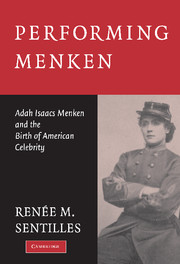Book contents
2 - Playing the Pugilist's Wife: 1859–1860
Published online by Cambridge University Press: 05 July 2014
Summary
The Empire City, into whose bosom pour the luxury and the crime of the Old World and the New. Upon her bay the ships of every sea; within her streets the people of every tongue, behold her, as she throbs with a million lives, throbs beneath that cloud made luminous by her glare, the Empire City clad in purples and in rags, splendid with countless wealth, festering with countless crimes. …
George Lippard, The Empire City, or New York by Night and Day (1850)It took Menken only five months to put herself in the national spotlight after moving to New York City. A virtual unknown in September 1859, by February 1860 newspaper readers from the East Coast to San Francisco knew her name. Scandal, the quickest route to fame or infamy, put Menken in the public eye. The term “scandal” implies a dissolution of public and private boundaries; it exposes a person's private actions to be judged on the public stage. Given all we know about Victorian emphasis on respectability, one would think that a major scandal should have destroyed Menken, but it did not. In many ways the scandal made Menken: It initially put her name before the public, won her contracts, and gave her an excuse to “share” her personal story, creating the illusion of intimacy necessary for celebrity. Menken also put some of the tricks she learned in Cincinnati to good use, such as publishing poetry that “revealed” her true self and suggested that she was the victim of male infidelity and nasty journalism. Under the guise of defense, she was able to speak directly to the public.
- Type
- Chapter
- Information
- Performing MenkenAdah Isaacs Menken and the Birth of American Celebrity, pp. 50 - 90Publisher: Cambridge University PressPrint publication year: 2003



